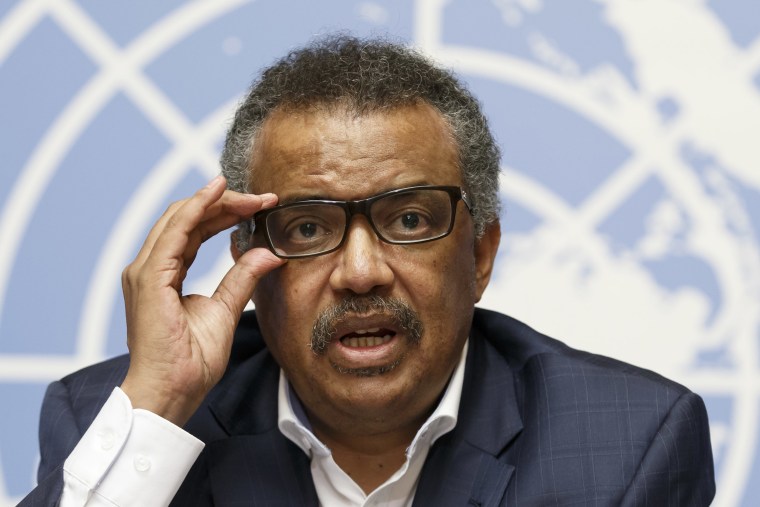LONDON — The head of the World Health Organization has ordered an internal investigation into allegations that the U.N. health agency is rife with racism, sexism and corruption, after a series of anonymous emails with the explosive charges were sent to top managers last year.
Three emails addressed to WHO directors — and obtained by The Associated Press — complained about "systematic racial discrimination" against African staffers and alleged other instances of wrongdoing, including claims that some of the money intended to fight Ebola in the Democratic Republic of Congo was misspent.
Last month, WHO Director-General Tedros Adhanom Ghebreyesus told staffers that he had instructed the head of WHO's office of internal oversight to look into the charges raised by the emails. He confirmed that directive to the AP on Thursday.
Critics, however, doubt that WHO can effectively investigate itself and have called for the investigation to be made public.
The first email, which was sent in April, claimed that there was "systematic racial discrimination against Africans at WHO" and that African staffers were being "abused, sworn at (and) shown contempt" by their Geneva-based colleagues.
Two further emails addressed to WHO directors complained that senior officials were "attempting to stifle" investigations into such problems and also alleged other instances of wrongdoing, including misspent Ebola funds.
The last email, sent in December, labeled the behavior of a senior doctor helping to lead the response against Ebola as "unacceptable, unprofessional and racist," citing a November incident at a meeting where the doctor reportedly "humiliated, disgraced and belittled" a subordinate from the Middle East.
Tedros — a former health minister of Ethiopia and WHO's first African director-general — said that investigators looking into the charges "have all my support" and that he would provide more resources if necessary.
"To those that are giving us feedback, thank you," he said at a meeting of WHO's country representatives in Nairobi, Kenya, last month. "We will do everything to correct (it) if there are problems."
But Tedros rebutted claims that WHO's hiring policies are skewed, arguing that his top management team was more geographically diverse and gender-balanced than any other U.N. organization after adopting measures to be more inclusive.
"There is change already happening," he said during the December staff meeting, according to an audio recording provided to the AP.
WHO's in-house investigation into misconduct comes after other U.N. agencies have been rocked by harassment complaints.
At UNAIDS, chief Michel Sidibé agreed to step down in December after an independent report concluded that his "defective leadership" had created a toxic working environment, with staffers complaining of rampant sexual harassment, bullying and abuse of power.
The author of the anonymous WHO emails also charged that there were "crooked recruitment and selection" processes that were "tantamount to fraud, corruption and abuse of authority."
In the latest anonymous message, the author singled out the supposedly flawed hiring process of a senior director in WHO's emergencies department, suggesting that it might have led to mistakes by incompetent officials involved in efforts to stop Ebola in Congo.
Some staffers feared that funds donated to stem the spread of the deadly virus "have not been used judiciously," the email said, warning that such blunders could undermine WHO's credibility.
"A plane was hired to transport three vehicles from the warehouse in Dubai at the cost of $1 million. Why would WHO ship vehicles from Dubai? We would appreciate the rationale when jeeps in DRC (Congo) can be purchased at $80,000 per vehicle," the email said, claiming that tales of corruption about logisticians and procurement in WHO's Geneva emergencies department are "legendary."
David Webb, director of WHO's office of internal oversight, said he and his team would scrutinize those accusations, in addition to the approximately 150 other claims that have been reported to his office this year. Webb said the investigation would be conducted independently even though it would be done by WHO staffers.
Critics outside the organization said that was not enough.
"That's the same office that botched the initial investigation at UNAIDS," said Edward Flaherty, a lawyer who represents Martina Brostrom, the UNAIDS whistleblower whose sexual harassment allegations ultimately triggered Sidibé's resignation. "Having an internal investigation at WHO is as good as doing nothing."
Oyewale Tomori, a Nigerian virologist who previously worked at WHO and now serves on several of its advisory groups, wasn't surprised by the emails' claims of racism, sexism and corruption.
"After what I've seen at WHO, I have no doubt that everything in those emails is true," he said.




